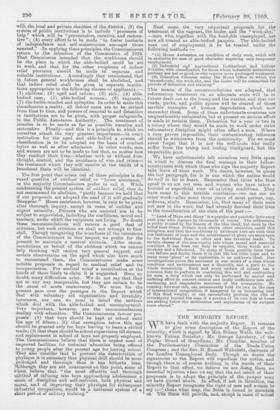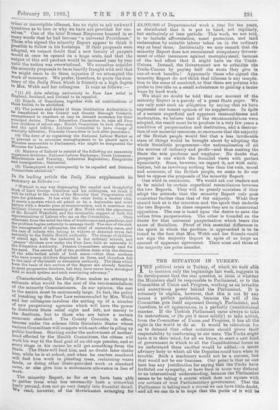THE MINORITY REPORT.
WE have dealt with the majority Report. It remains to give some description. of the Report of the minority, which is signed by Mrs. Sidney Webb, the well- known Fabian Socialist ; Mr. George Lausbury, of the Poplar Board of Guardians ; Mr. Chandler, member of the Parliamentary Committee of the Trade-Union Congress ; and the Rev. It Russell Wakefield, chairman of the London Unemployed Body. Though no doubt the signatories to the Report will repudiate the notion, and though there is of course nothing in the words of their Report to that effect, we believe we are ,doing them no essential injustice when we say that the net result of their proposals is to adopt the principle of the pauper song we babe quoted above. In effect, if not in intention, the minority Report recognises the right of men and women to say :—, "Come what may, the State is bound to maintain IA The State will provide, and, except in cases of actual crime or incorrigible idleness, has no right to ask awkward ' questions as to how or why we have not provided for our- helves." One of the later Roman Emperors boasted in so rattily words that he had become " a universal Providence." Those who signed the minority Report, appear to think it possible to follow in his footsteps. If their proposals were adopted, we cannot doubt that a new factory of paupers would at once be opened on a huge scale, and that the butput of this evil pvocluct would be increased year by year Until the nation was overwhelmed. We ourselves Consider the minority proposals to be so heavily fraught with evil that We might seem to do them injustice if we attempted the work of summary. We prefer, therefore, to quote the stria- Mary of the Daily Newt, which is friendly in a high degree to Mrs. Webb and her colleagues. It runs as follows " (1) All Acts relating exclusively to Poor Law relief in England, Scotland, and Ireland to be repealed.
(2) Boards of Guardians, together with all combinations of these bodies, to be abolished.
(3) The powers and duties of these Destitution Authorities to be transferred to the County and County Borough Councils, strengthened in numbers ai may be deemed necessary for their enlarged duties. Thus : Education Committee to take all Poor Law children of school age; Health Committee to look after sick and the aged infirm ; Asylums Committee to have charge of mentally defective ; Pensions Committee to look after pensioners.
(4) The duty of so organising the National Labour Market as to prevent or to minimise unemployment to be placed upon• at Minister responsible to Parliament, who might be designated the Minister for Labour.
(5) Ministry of Labour to consist of the folloWing six separately organised divisions: National Lebow.. Exchange ; Trade Insurance ; Maintenance and Training ; Industrial Regulation; Emigration and lunnigration ; StatistiCal.
(6) Unemployed Act consequently to be repealed and Distress Committees abolished."
In its leading article the Daily News supplement's its flummery as follows: "Without in any way disparaging the careful and thoughtful kvork of Lord George Hamilton and his colleagues, we think it Will be rather to the work of the Minority that Progressives will turn for guidance. It has what the other lacks, to Central idea. It meets a system which all admit to be a deplorable and cruel failure with a drastic plan of reconstruction, and it combines the brilliant literary workmanship of Mrs. Webb with the experience of Mr. Russell Wakefield, and the in.valuablo support of both the representatives of Labour who sat on the CoMmission Once eliminate from the mind the idea of workhouses and guardians, and the problem begins naturally to arrange itself. The care of the sick, the management of infirmaries, the relief of maternity cases, and the care of infants who belong to widows or deserted wives fall twaturaaly to the Public Health authority. The charge of children bf school age, both the underfed in the ordinary schools, and pauper' children now under the Poor Law, falls as naturally to the Education Authority. Pension Committees already care for the aged. The second half of the problem deals with the distress Of the able-bodied adult of both sexes—other than mothers who have young children dependent on them, and therefore fall to the care of the health or education authority. The ideas which form the basis of this section of the Report are already familiar to most progressive thinkers, but they have never been developed With so much system and such convincing advocacy."
Characteristically, the Daily News makes no attempt to estimate what would be the cost of the recommendations of the minority Commissioners. In our opinion, the cost to the nation must be enormously large. In fact, the policy of breaking up the Poor Law recommended by Mrs. Webb and her colleagues involves the setting up of a number of new pauperising agencies which will have the power to distribute State relief right and left, not merely to the destitute, but to those who are below a certain economic standard. The County Councils, in effect, become under the scheme little Socialistic States whose Various Committees will compete with each other in piling up public burdens. Starting under the endowment of mother- hood effected by the Health Couimittees, the citizen will work his way to the final goal of an old-age pension, and at every stage in his career he will get something from the ,State. The State.will feed him, and no doubt later clothe him, while he is at school, and when he reaches manhood will find him work in planting trees, reclaiming waste lands, or doing other State-provided work at standard rates, or else give him a sustenance allowatice in lieu of work.
The minority Report, as far at we have been able to gather from what has necessarily been a somewhat hasty perusal, does not go very deeply into financial We read) howeVer, of the Government arranging for £4,000,000 of Departmental work a year for ten years, so distributed that it is put in hand, not regularly, but exclusively at loan periods: This work, we are told, is to include afforestation, coast protection, and land reclamation by suitable labour taken on in the ordinary way at local rates. Incidentally we may remark that the minority Report does not recommend compulsory Govern- ment or other insurance against uneitiploymerit, because -of the bad effect that it might have on the Trade- Unions. Instead, the Government are to sebsiditie the Trade-Unions by paying half the sums they give it out-of-work benefits l Apparently those who sighed the minority Report do not think that idleness ie any tempta- tion to the mass of mankind, br that there are persons *he prefer to live idle on a small subsistence to gaining a better wage by bard work. We shall no doubt be told. that our account of the minority Report is a parody of a great State paper. We can only meet such an allegation by saying that we have expressed our honest opinion of its suggestions. Iii spite of a certain superficial and apparent reasonableness and moderation, We believe that if the recommendations were adopted, the result must be to produce in a very few years a condition of pauperisation and destitution, and a destruc- tion of our material resources, so enormous that the majority of the British people would feel that a less intolerable state of things wodld be brought about by adopting the whole Socialistic programme—the nationalisation of all the sources of industry and profit—and thus making the State the sole producer and employer. No doubt that prospect is one which the Socialist views with perfect 'equanimity. Since, however, we regard it, not with satis- faction, but as involving nothing less than the ruih, moral and economic, of the British people, we mean to do our best to oppose the proposals of the minority Report. One word in conclusion. We would ask our readers not to be misled by certain superficial resemblances between the two Reports. They will be greatly mistaken if they adopt the attitude that the minority Report only goes somewhat further than that of the majority. What they should look at is the intention and the spirit that anderlie the two Reports. In these respects they are in diametrical opposition. The one is based upon the desire to save the uation from pauperisation. The other is founded on the desire for that universal pauperisation which bears the name of Socialism. Proof of this essential difference in the spirit in which the problem is approached is to be found in the fact that Mrs. Webb and her friends could not sign the majority 'Report in spite of so large an amount of apparent agreement. Their aims and those of the majority are poles asunder.











































 Previous page
Previous page